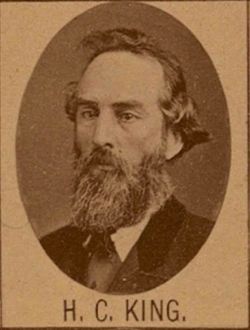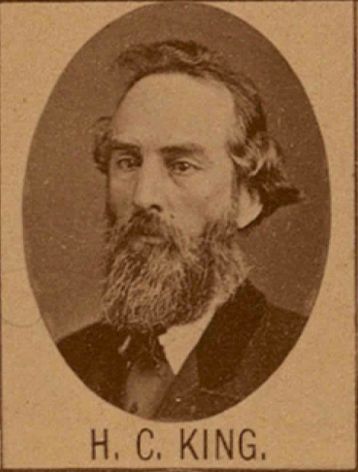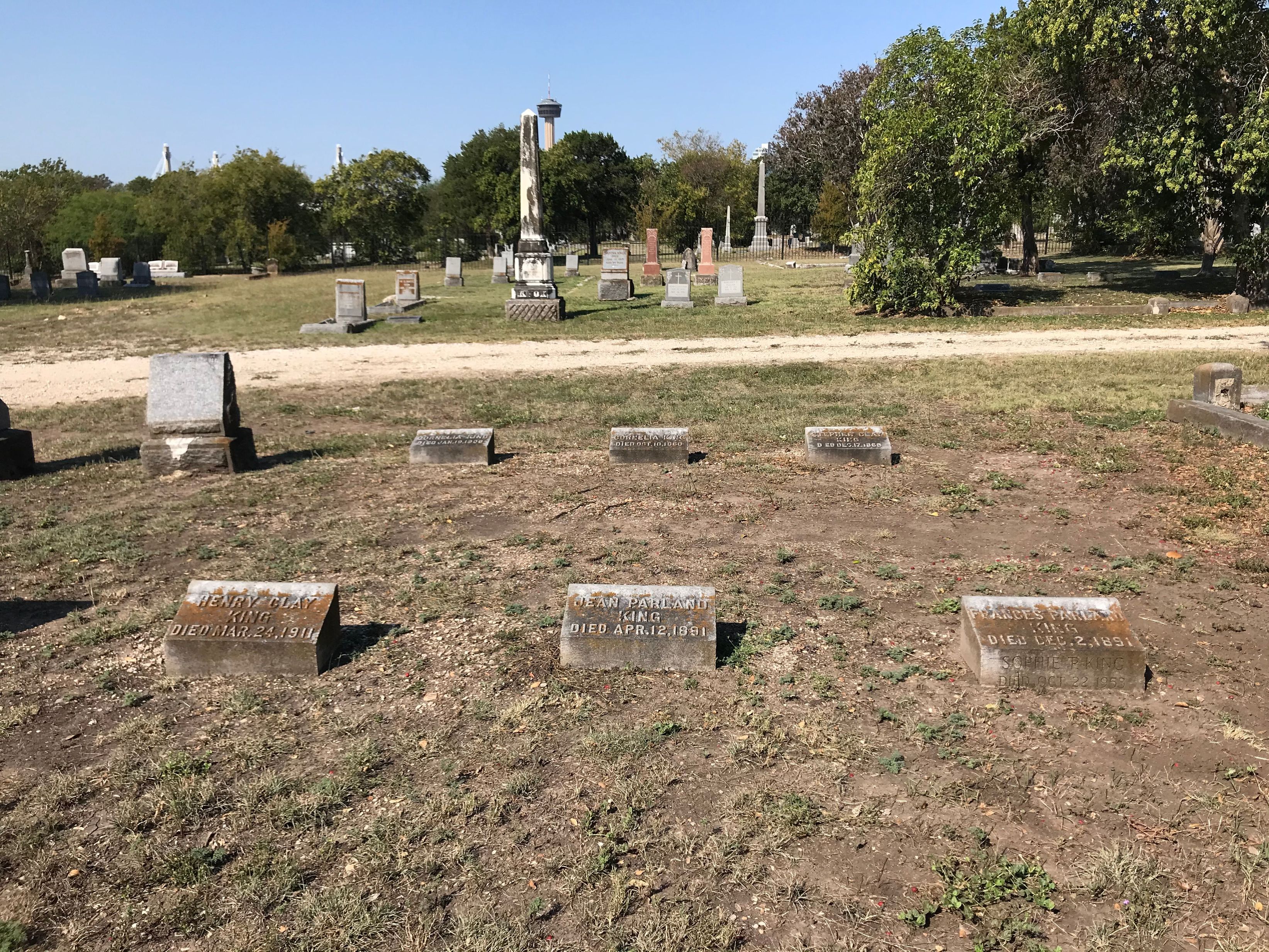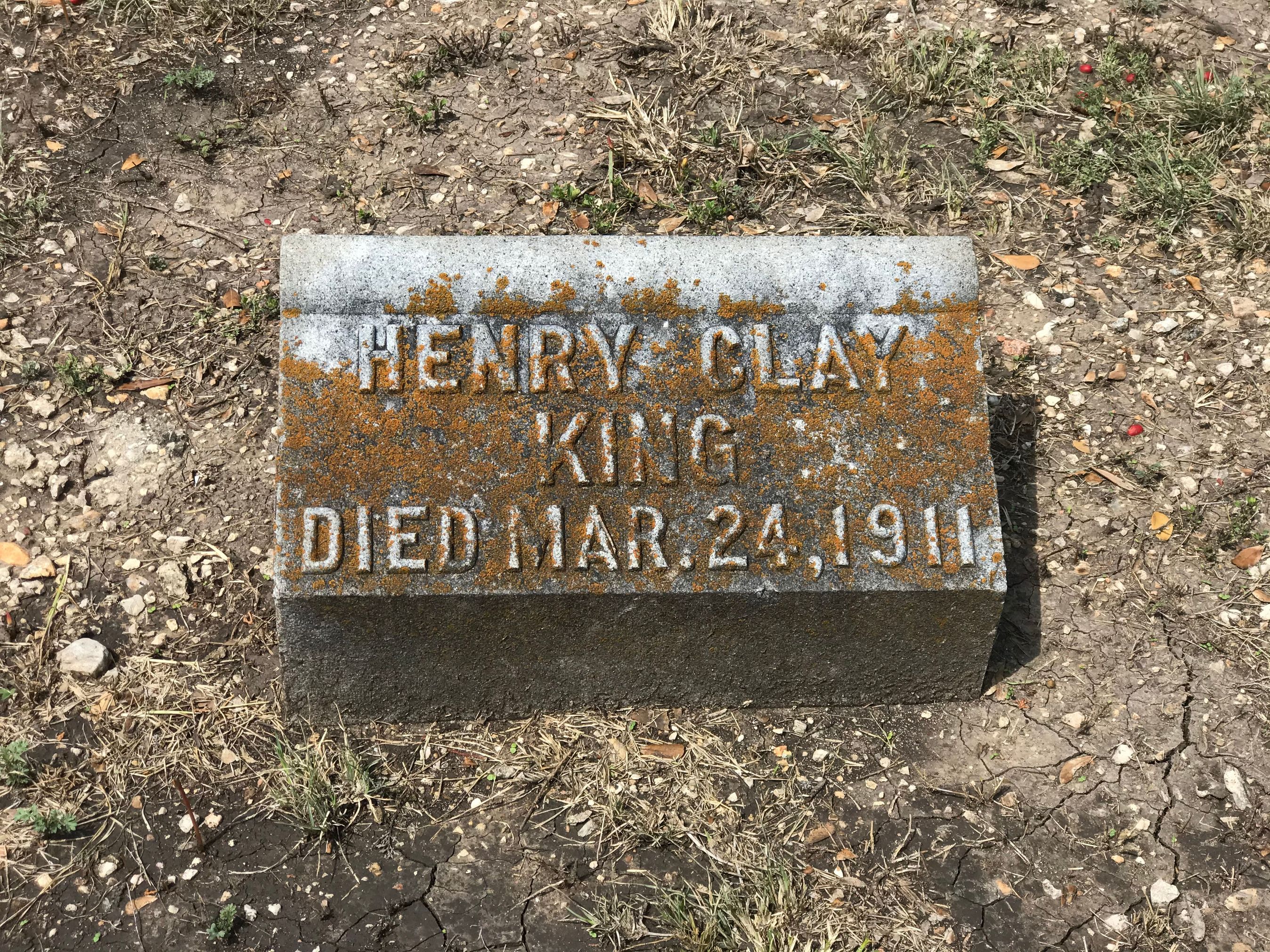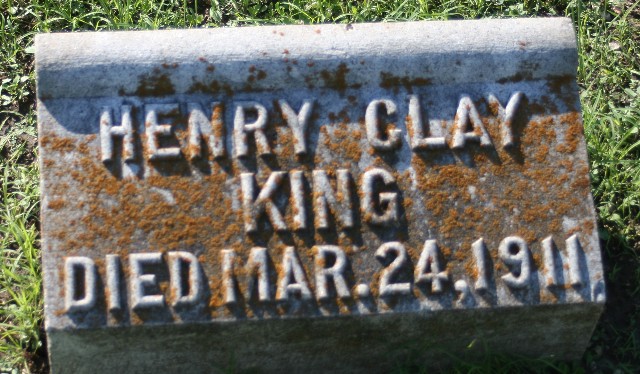It is a pleasure to chronicle the history of a man whose life has been one of honor and usefulness, and although he has considerably passed the zenith of his career, Hon. Henry C. King enjoys to the fullest extent the comforts of a home that is made beautiful by the sweet spirit of kindliness and mutual appreciation among the members of the family. He comes of good old Georgia stock, and was born in that State in 1830, the fourth of eight children born to Stephen Clay and Mary Eleanor (Fort) King, who were born in Massachusetts and Georgia respectively. The paternal grandfather, Daniel King, born in Kingston, (now Palmer) Mass., September 2, 1749, was an officer in the Revolutionary War, attaining the rank of Captain, and was a participant in the famous battle of Bunker Hill. After the war he resided for some time in Connecticut, then moved to Wilbesbarre, Penn., and died March 5, 1815, after having devoted his attention to farming. His father, Thomas King, was born at Kingston, Mass., in 1879 [sic], and died in 1801. His father was John King, of Edwardston, England, born in 1681; was an officer of the British navy; came to America with a grant of lands and settled in Massachusetta in 1710, and founded Kingston in that colony. He died in 1744. The maternal grandfather, James Fort, was a native of North Carolina, and became a Lieutenant in the Revolutionary War, and participated in the siege of Yorktown. He was married to Martha Gibson, of North Carolina, after which he removed to Georgia, about the beginning of this century. He was a member of the Legislature of Georgia, and a Major in the State Militia. He died in that State in 1848. He was also of Scottish descent, and of an old and prominent family. His wife was a daughter of Stephen Gibson, a wealthy planter. Stephen Clay King, father of the subject of this sketch followed the occupation of planting, was married in the State of Georgia, and there spent his life. He died while visiting his son at San Antonio, Texas, in 1860. He had always taken much interest in public affairs, and was a member of the convention of 1858, which postponed secession. He was often solicited to make the race for some official position, but always declined. His wife died in 1852.
The subject of this sketch was reared and educated in Georgia, aud graduated at Oglothor|»e University in 1849, after which he at once began studying law under Juiuert L. Pettigrew, of Charleston, S. C, the foremost lawyer of his day. Owing to failing health the law course was not completed, aud the winter of 1851-52 was spent in the Rocky Mountains for sport and health. In the summer of 1852 he made another trip to the Rockies, the journey being made up the Arkansas and down the Platte rivers, and during this time his health was greatly benefited. In 1854 he began planting in Georgia, but the life in the West had still its attractions for him, and in 1856 he made a trip to the base of Pike's Peak and spent one summer in that hunter's paradise, accompanied by a younger brother and a hired guide and camp servants. In 1860 he made a trip to Colorado, visiting Denver; its site on his former visits was a wilderness, then a city of 4,000 souls. The summer of 1859 had been spent in Texas, mainly in San Antonio, on a visit to George W. Kendall, of New Braunfels, and in 1860 he returned here, to permanently locate, and took up his residence in San Antonio. His health again failing him in 1861, he bought a ranch north of the city and retired there to reside until 1869, during which time he was engaged in the raising of cattle. In 1869 he went to Boerne, Texas, and there, in 1870, began practicing law, but seven years later located in San Antonio, where he has since resided, and for some time past has been retired.
He has always been quite active in politics, and in 1872 was honored by an election to the State Senate, and was Chairman of the Committee on Indian Affairs, and a member of the Judiciary and other committees. He introduced a number of bills, and did able and effective work while a Senator, but after serving one term declined re-election. He was a member of the State Constitutional Convention of 1875, served on various important committees, and was Chairman of the Committee on Public Lands. He was appointed by Governor Coke, and also Governor Hubbard, a Commissioner of canal and ditches for navigation and irrigation, and has been Commissioner of the State for tho sale and lease of school lands. He was appointed by President Harrison as a Democratic World's Fair Commissioner at Large from Texas, and as such did valuable work in that State.
He was married 1856 to Miss Jean Adams Parland, a native of Georgia, who died in 1891, having become the mother of seven children: Mary Parland, Martha Gibson, wife of W. W. King, of Georgia; Jean Parland, wife of J. Mastella Clarke, of Mexico, the proprietor and publisher of The Two Republics; Cornelia, Henry C, Jr., with The Express; and Sophia and Frances, twins, the latter of whom died in 1891. Mr. King is a member of the Presbyterian Church, is a Mason socially, and is a polished, courteous and scholarly gentleman, and is universally esteemed. [Transcribed from: "Memorial and Genealogical Record of Southwest Texas" Chicago: Goodspeed Brothers, Publishers 1894 page 572-573]
It is a pleasure to chronicle the history of a man whose life has been one of honor and usefulness, and although he has considerably passed the zenith of his career, Hon. Henry C. King enjoys to the fullest extent the comforts of a home that is made beautiful by the sweet spirit of kindliness and mutual appreciation among the members of the family. He comes of good old Georgia stock, and was born in that State in 1830, the fourth of eight children born to Stephen Clay and Mary Eleanor (Fort) King, who were born in Massachusetts and Georgia respectively. The paternal grandfather, Daniel King, born in Kingston, (now Palmer) Mass., September 2, 1749, was an officer in the Revolutionary War, attaining the rank of Captain, and was a participant in the famous battle of Bunker Hill. After the war he resided for some time in Connecticut, then moved to Wilbesbarre, Penn., and died March 5, 1815, after having devoted his attention to farming. His father, Thomas King, was born at Kingston, Mass., in 1879 [sic], and died in 1801. His father was John King, of Edwardston, England, born in 1681; was an officer of the British navy; came to America with a grant of lands and settled in Massachusetta in 1710, and founded Kingston in that colony. He died in 1744. The maternal grandfather, James Fort, was a native of North Carolina, and became a Lieutenant in the Revolutionary War, and participated in the siege of Yorktown. He was married to Martha Gibson, of North Carolina, after which he removed to Georgia, about the beginning of this century. He was a member of the Legislature of Georgia, and a Major in the State Militia. He died in that State in 1848. He was also of Scottish descent, and of an old and prominent family. His wife was a daughter of Stephen Gibson, a wealthy planter. Stephen Clay King, father of the subject of this sketch followed the occupation of planting, was married in the State of Georgia, and there spent his life. He died while visiting his son at San Antonio, Texas, in 1860. He had always taken much interest in public affairs, and was a member of the convention of 1858, which postponed secession. He was often solicited to make the race for some official position, but always declined. His wife died in 1852.
The subject of this sketch was reared and educated in Georgia, aud graduated at Oglothor|»e University in 1849, after which he at once began studying law under Juiuert L. Pettigrew, of Charleston, S. C, the foremost lawyer of his day. Owing to failing health the law course was not completed, aud the winter of 1851-52 was spent in the Rocky Mountains for sport and health. In the summer of 1852 he made another trip to the Rockies, the journey being made up the Arkansas and down the Platte rivers, and during this time his health was greatly benefited. In 1854 he began planting in Georgia, but the life in the West had still its attractions for him, and in 1856 he made a trip to the base of Pike's Peak and spent one summer in that hunter's paradise, accompanied by a younger brother and a hired guide and camp servants. In 1860 he made a trip to Colorado, visiting Denver; its site on his former visits was a wilderness, then a city of 4,000 souls. The summer of 1859 had been spent in Texas, mainly in San Antonio, on a visit to George W. Kendall, of New Braunfels, and in 1860 he returned here, to permanently locate, and took up his residence in San Antonio. His health again failing him in 1861, he bought a ranch north of the city and retired there to reside until 1869, during which time he was engaged in the raising of cattle. In 1869 he went to Boerne, Texas, and there, in 1870, began practicing law, but seven years later located in San Antonio, where he has since resided, and for some time past has been retired.
He has always been quite active in politics, and in 1872 was honored by an election to the State Senate, and was Chairman of the Committee on Indian Affairs, and a member of the Judiciary and other committees. He introduced a number of bills, and did able and effective work while a Senator, but after serving one term declined re-election. He was a member of the State Constitutional Convention of 1875, served on various important committees, and was Chairman of the Committee on Public Lands. He was appointed by Governor Coke, and also Governor Hubbard, a Commissioner of canal and ditches for navigation and irrigation, and has been Commissioner of the State for tho sale and lease of school lands. He was appointed by President Harrison as a Democratic World's Fair Commissioner at Large from Texas, and as such did valuable work in that State.
He was married 1856 to Miss Jean Adams Parland, a native of Georgia, who died in 1891, having become the mother of seven children: Mary Parland, Martha Gibson, wife of W. W. King, of Georgia; Jean Parland, wife of J. Mastella Clarke, of Mexico, the proprietor and publisher of The Two Republics; Cornelia, Henry C, Jr., with The Express; and Sophia and Frances, twins, the latter of whom died in 1891. Mr. King is a member of the Presbyterian Church, is a Mason socially, and is a polished, courteous and scholarly gentleman, and is universally esteemed. [Transcribed from: "Memorial and Genealogical Record of Southwest Texas" Chicago: Goodspeed Brothers, Publishers 1894 page 572-573]
Family Members
Sponsored by Ancestry
Advertisement
Records on Ancestry
Advertisement
